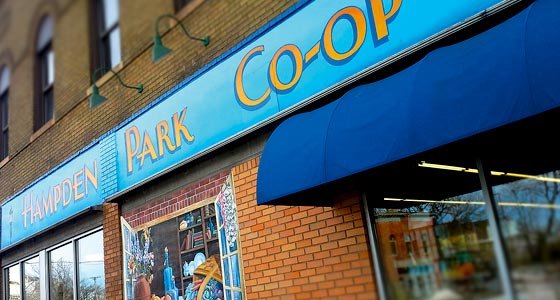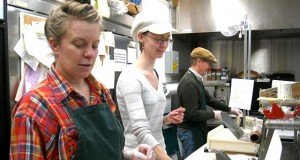The great recession, road construction on both University and Raymond, contribute to struggle
 In 1979, the nonprofit St. Anthony Park Foods (SAP) acquired Green Grass Grocery, located at the 938 Raymond site. Green Grass was renamed SAP TOO and then became Hampden Park Foods in 1990. In June 1993 Hampden Park Co-op was legally formed and in 2009, the Co-op purchased the building it had been renting since 1978.[/caption]
In 1979, the nonprofit St. Anthony Park Foods (SAP) acquired Green Grass Grocery, located at the 938 Raymond site. Green Grass was renamed SAP TOO and then became Hampden Park Foods in 1990. In June 1993 Hampden Park Co-op was legally formed and in 2009, the Co-op purchased the building it had been renting since 1978.[/caption] By JAN WILLMS
Although the first consumer cooperative was founded in 1844 on Toad Lane in Rochdale, England, its code of principles are still followed today by most co-ops. Hampden Park Co-op at 938 Raymond Ave. is no exception.
Voluntary and open membership, democratic member control, member economic participation, autonomy and independence, cooperation among cooperatives, concern for community and education, training and information are still the principles that govern the Hampden Park Co-op.
And following these guidelines has continued to make the Co-op stand out in the neighborhood, even as mainstream groceries are beginning to go organic.
 Greg Junge, general manager of Hampden Park Co-op since August, said that the Co-op currently has three full-time employees and 20 part-time staff. There are 200 participating volunteers, and a membership base of 4000. (Photo by Jan Willms)[/caption]
Greg Junge, general manager of Hampden Park Co-op since August, said that the Co-op currently has three full-time employees and 20 part-time staff. There are 200 participating volunteers, and a membership base of 4000. (Photo by Jan Willms)[/caption] “We listen to our members, and we adhere to our values,” General Manager Greg Junge explained. Junge took over his position in August of this year, at a time when Hampden Park Co-op has been struggling financially.
The recession, followed by light-rail construction on University and additional construction work on Raymond Avenue have all been contributing factors to the economic struggles of the store, but drawing on its strengths as a co-op is helping to turn Hampden Park Co-op around.
“We have seen a 6.5 per cent sales increase since mid-October,” Junge said. “We have had a very good response from the community, and our sales are growing.”
The store has been asking its members to voluntarily donate their discounts, and the 15 per cent senior discount is being considered for possible restructure.
“We have spread the word to our membership base,” Junge said, “telling our situation and what we need to do. We’re restructuring and listening to the voice of the community as to the direction we should take.”
“The community is responding; they truly want us to be here,” Junge said.
He said that co-ops continue to be a strong presence in their communities based on their history and values.
“As conventional stores step into the role of organics, I think that’s actually helping the co-op through exposure to these products,” he noted. He said he believes people have learned how buying locally helps sustain the local farming community.
Junge said the Hampden Park Co-op has also combined its efforts with those of local Community Supported Agriculture (CSA) farms. For many years, CSAs have been a popular way for consumers to buy local seasonal food directly from a farmer.
“We see CSAs as an advantage, and we support them,” Junge said. “We’re a drop-off unit for five CSAs right here in the Co-op. We put them in the front.”
Junge said a co-op relies on collective efforts.
 (l to r) Volunteers Alex Newby, Mikaila Dahlseng and Mel Seeland spend an evening at the Co-op cutting cheese. (Photo by Jan Willms)[/caption]
(l to r) Volunteers Alex Newby, Mikaila Dahlseng and Mel Seeland spend an evening at the Co-op cutting cheese. (Photo by Jan Willms)[/caption] “We conduct our business through the relationships we’re making,” he said. He emphasized the importance of the products the store buys and the joint action it takes. The store has started carrying items created by Soluppa Soups and Fred’s Bread, both local suppliers.
“We’ve always been a green institution,” Junge added. “We’re not just putting a fresh tomato in a salad to make it better—that’s always the way we have operated.”
The Hampden Co-op has two kitchens. One is more of a deli operation, where volunteers gather to learn and perform tasks such as cutting cheese. The other kitchen is a produce kitchen, where in-house soups are created.
“We serve as a source for a lot of local chefs,” Junge continued. He said the Co-op puts a guarantee behind the products it sells.
The roots of the Hampden Park Co-op began with St. Anthony Park Foods (SAP), a nonprofit that opened in 1972, across from the St. Paul campus at the University of Minnesota. In 1979, SAP acquired Green Grass Grocery, located at the 938 Raymond site. Green Grass was renamed SAP TOO and then became Hampden Park Foods in 1990. In June 1993 Hampden Park Co-op was legally formed and in 2009, the co-op purchased the building it had been renting since 1978.
Junge said the Co-op currently has three full-time employees and 20 part-time staff. There are 200 participating volunteers, and a membership base of 4,000.
Becoming a member requires purchasing a share of stock at a cost of $30. A member can volunteer or participate in the governance of the co-op and share in the distribution of allocated profits at the end of the fiscal year.
“The Co-op is a culture we have created,” Junge said. “People feel at home.“
He said the Co-op is considering better ways to open up the building and use it, possibly looking at adding a café. There is also room for office space and meetings.
“We want to become more of a community asset,” Junge noted. “We are leveraging ourselves to become a better steward of the area.”
He added that Hampden Co-op is exploring ways to create and grow, add to its product offerings and make people aware of its existence.
“We are still the small engine that could,” Junge said. “We have been here a long time and will continue to be. People truly believe in what we are doing.”
Comments
No comments on this item Please log in to comment by clicking here